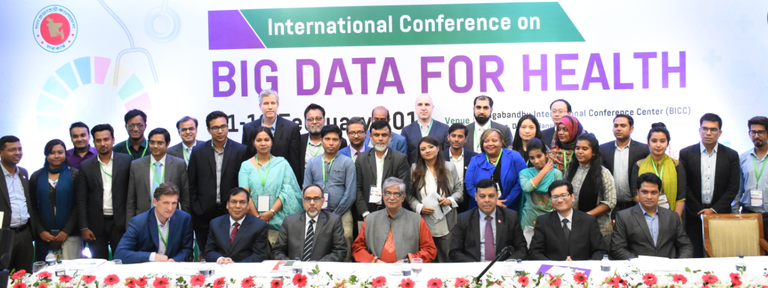MEASURE Evaluation Co-organizes the International Conference on Big Data for Health

DHAKA, Bangladesh―How Bangladesh can use multiple sources of “big data”—large, complex data sets from sources such as the national health information system and population-based surveys—to improve health policies and programs in Bangladesh was the subject of a recent multisectoral meeting of governmental, donor, and digital health experts in the capital.
MEASURE Evaluation, funded by the United States Agency for International Development (USAID), co-organized the International Conference on Big Data for Health in Dhaka, Bangladesh, which was jointly hosted by Access to Information (a2i), the Ministry of Health and Family Welfare (MOHFW), the Bangladesh Bureau of Statistics, UNICEF, icddr,b, and Bloomberg Data for Health (D4H). The conference took place February 11–12, 2019 at the Bangladesh International Conference Center in Dhaka.
The conference provided a timely platform to exchange knowledge, experiences, and expertise to discuss digital innovations and ways to harness big data for sustainable development in health service delivery. Approximately 150 people attended, including government representatives and experts from organizations that have implemented successful health-related big data solutions. They represented 15 different countries―including the United States, the United Kingdom, Australia, Japan, and China. Participants shared both contextual and hands-on information. They also discussed the role of big data in improving healthcare and adapting healthcare activities to achieve more predictive, cost-effective public health approaches that would benefit patients.
The conference was inaugurated by the Honorable Minister Mr. Mustafa Jabbar, Ministry of Posts, Telecommunications and Information Technology. “Bangladesh has gained the capability to lead in the digital technology world,” Mr. Jabbar said. “We are the first country to declare ourselves as digital. We will not be lagging behind in technology. Big data will not be a big challenge for us. There are plans to introduce 5G between 2021–2023.”
Conference sessions were organized to address three thematic areas: (1) international experiences with big data applications that have led to improvements in health outcomes; (2) existing and potential big data sources for health-related applications in Bangladesh; and (3) strategies for building capacity to develop health-related big data applications.
Several MEASURE Evaluation staff facilitated and presented at the big data conference. Mr. MM Reza, chief technical advisor, Technical Assistance Support Team (TAST) to the Program Management and Monitoring Unit of MOHFW, moderated a session on policies to support big data solutions. Mr. Md. Humayun Kabir, senior strategic and technical advisor, presented an overview of big data sources in Bangladesh in a thematic session. Mr. Mohammad Golam Kibria, health information system and monitoring and evaluation (M&E) advisor, provided technical support to organize the conference and helped to conceptualize how to leverage big data to improve health outcomes. MEASURE Evaluation, in collaboration with icddr,b, also hosted a booth featuring electronic management information system (eMIS) tools and that showcased country-specific results of USAID-supported eMIS initiatives.
Mr. Anir Chowdhury, policy advisor at a2i, cited the key achievements of the two-day conference in his concluding remarks. “We have found commitments from stakeholders through their participation,” Mr. Chowdhury said. “Now we will be able to establish a general platform to apply big data accumulated from different sources. The culture of data use in Bangladesh comes from a culture of reporting. We need to change that mindset to culture of problem solving.”
The conference culminated in a workshop which developed a midterm road map for how Bangladesh can leverage big data sources and techniques to create policies and programs that improve health in Bangladesh.












